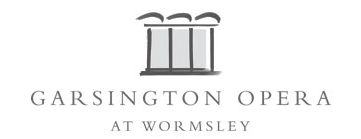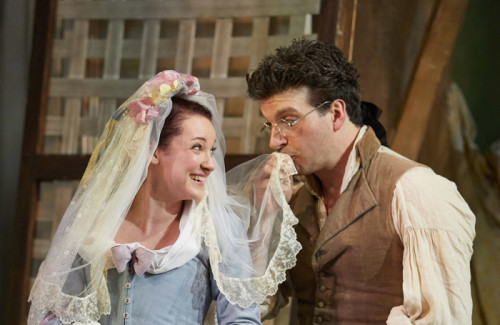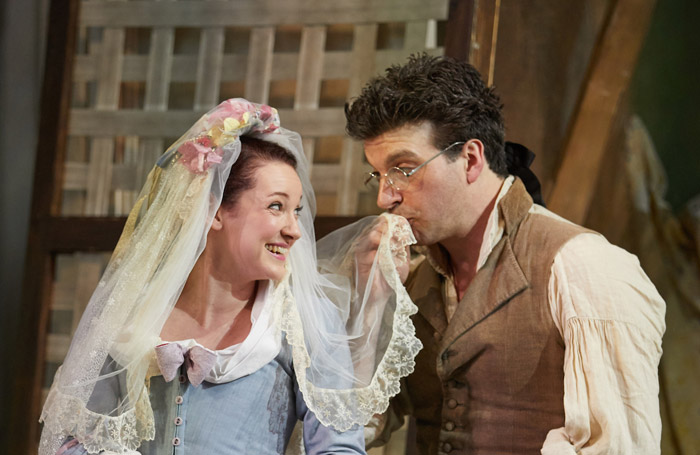
 United Kingdom Mozart, Le nozze di Figaro: Soloists, Garsington Opera Orchestra & Chorus / Douglas Boyd, Garsington Opera at Wormsley, 2.6.2017. (CR)
United Kingdom Mozart, Le nozze di Figaro: Soloists, Garsington Opera Orchestra & Chorus / Douglas Boyd, Garsington Opera at Wormsley, 2.6.2017. (CR)

Cast:
Figaro – Joshua Bloom
Susanna – Jennifer France
Count – Duncan Rock
Countess – Kirsten MacKinnon
Cherubino – Marta Fontanals-Simmons
Bartolo – Stephen Richardson
Marcellina – Janis Kelly
Basilio – Timothy Robinson
Curzio – Alun Rhys-Jenkins
Antonio – Andrew Tipple
Barbarina – Alison Rose
Production:
Director – John Cox
Associate Director – Bruno Ravella
Designer – Robert Perdziola
Lighting Designer – Mark Jonathan
Choreographer – Kate Flatt
John Cox’s production of The Marriage of Figaro received its first outing at Garsington Manor in 2005, but it works effectively on the larger, open space of the stage at Wormsley in this revival. Over the course of the opera the sets peel back from the room appointed for Susanna and Figaro, the Countess’s bedroom, the hall or presence chamber of the Count, and finally opening up for the garden of Act IV where, against the backdrop of nature and the darkness of night, the illusions of disguise, infatuation and class are dissolved (even if only temporarily) and we glimpse something of the sincere relations that might arise between humans if they would only divest themselves of such artificial distinctions or misguided, impulsive desires.
Along the way there is much jesting and wit in a generally well choreographed realisation of this opera’s constantly shifting plot (although the translation used for the surtitles is generally rather anodyne, failing to draw out all the humour that could be found in the text). Some of the action is knockabout, but that does not outstay its welcome, and it is surprising, perhaps, that there is no action on the stage during the Overture, except as the characters for the first scene emerge at its end. There are moments when the tension sags a little, partly on account of the music not being driven quite urgently enough, or dramatic incidents not pointed up more sharply, the most notable instance being the somewhat mannered contribution from Don Basilio when he arrives in Susanna’s room in Act I. That ensemble should be shot through more with the sense of expectation and suspicion which the protagonists feel about their potentially or actually compromising situations, given Cherubino’s presence in the room as well.
But these are only occasional disruptions to the performance which is marked by a strong cast who characterise their roles idiomatically, even if the musical results are variable. The production is set at the time of composition, in the 1780s, so not only is there colour and elegance, it is also faithfully located in Spain, as suggested by the panoply of ancestors’ portraits adorning the walls of the Count’s hall in Act 3, emphasising the nobility of his aristocratic heritage that he should be upholding; or perhaps representing a social and political order that is ripe for overthrowing, as Figaro had earlier, symbolically, removed the Almaviva coat of arms from the room he is preparing for Susanna and himself.
Joshua Bloom was a notably vociferous Figaro, at times perhaps even lacking the charm that should make the audience entirely sympathetic to his purpose of defeating the Count’s wiles, but he was clearly engaged with the role as such. Duncan Rock was more than a match as a suave and lyrical Count Almaviva, by no means an effete aristocratic playboy out of his depth, but a charismatic presence on stage as might be expected from a singer who has also successfully inhabited the role of Don Giovanni.
Jennifer France sang Susanna sweetly and cheerfully, if not quite the coquette the role can be made to be, but she maintained quiet control and authority, complementing the dignity of Kirsten MacKinnon’s Countess, though often sounding brittle. Marta Fontanals-Simmons’s performance as Cherubino was one of the highlights of the evening, not only for her sounding clear and earnest in charting the character’s burgeoning romantic feelings, but also for the capricious, mercurial way in which she brought the part to life.
Janis Kelly and Stephen Richardson played the roles of Marcellina and Doctor Bartolo respectively with somewhat more comedy than is often encountered, particularly in the latter case, such that his aria ‘La vendetta’ embodied no real sense of threat at all, and indeed when his singing there was not obscured by the orchestra, he tended to bellow in order to project an impression of determination. Kelly sounded squally but that may have been an intended effect to characterise Marcellina’s shrewish temperament. Andrew Tipple conveyed musical sense in the role of the drunken gardener, Antonio, and it was a pleasing facet of this production that during Act 2 he first tottered around the gardens outside the auditorium before entering the action proper in order to complain about Cherubino’s escape from the Countess’s window. Alun Rhys-Jenkins was suitably fawning as the lawyer, Don Curzio, whilst Timothy Robinson captured the sly but effete nature of Don Basilio, as he stirs up trouble, by the reedy tone of voice he adopted.
Douglas Boyd led a choppy account of the score from the pit. Undoubtedly there was energy and vitality in the performance, but there were times when it needed more polish, such as over-prominent oboes or horns, or some untidy playing from the strings, which disturbed the radiant beauty of the Countess’s ‘Porgi amor’. Future performances will presumably iron out these flaws. Minor blemishes aside, this is an overall consistent interpretation of a ubiquitous work that certainly does not become overfamiliar in this production but which both entertains the audience and keeps it alert to the almost miraculous succession of episodes and incidents.
Further performances on 8, 10, 17 June, 3, 6, 9, 11, 14, 16 July.
Curtis Rogers
